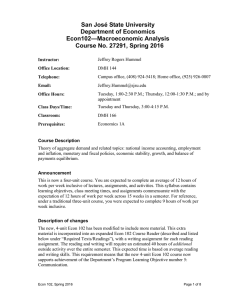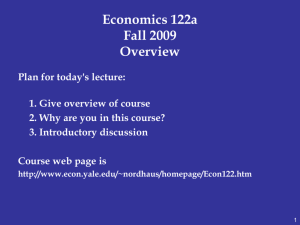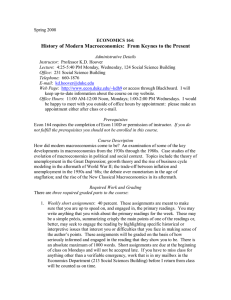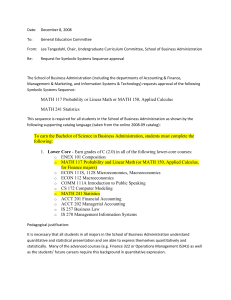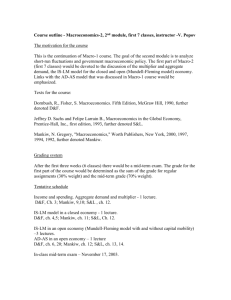San José State University Department of Economics —Seminar in Macroeconomic Analysis Econ 202
advertisement
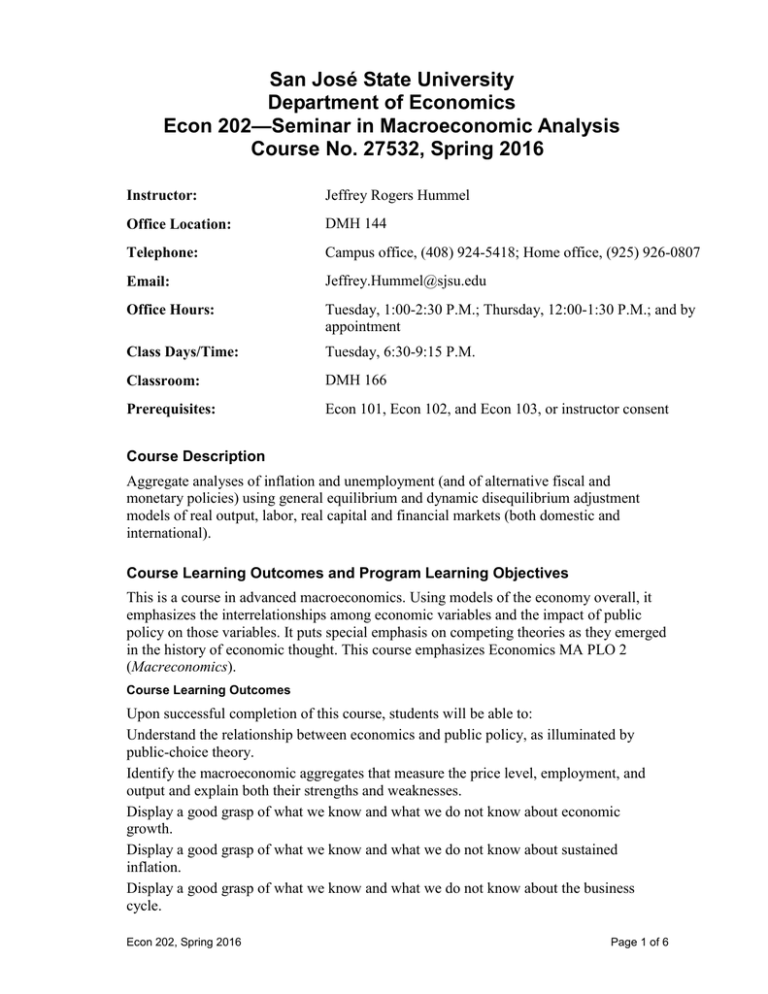
San José State University Department of Economics Econ 202—Seminar in Macroeconomic Analysis Course No. 27532, Spring 2016 Instructor: Jeffrey Rogers Hummel Office Location: DMH 144 Telephone: Campus office, (408) 924-5418; Home office, (925) 926-0807 Email: Jeffrey.Hummel@sjsu.edu Office Hours: Tuesday, 1:00-2:30 P.M.; Thursday, 12:00-1:30 P.M.; and by appointment Class Days/Time: Tuesday, 6:30-9:15 P.M. Classroom: DMH 166 Prerequisites: Econ 101, Econ 102, and Econ 103, or instructor consent Course Description Aggregate analyses of inflation and unemployment (and of alternative fiscal and monetary policies) using general equilibrium and dynamic disequilibrium adjustment models of real output, labor, real capital and financial markets (both domestic and international). Course Learning Outcomes and Program Learning Objectives This is a course in advanced macroeconomics. Using models of the economy overall, it emphasizes the interrelationships among economic variables and the impact of public policy on those variables. It puts special emphasis on competing theories as they emerged in the history of economic thought. This course emphasizes Economics MA PLO 2 (Macreconomics). Course Learning Outcomes Upon successful completion of this course, students will be able to: Understand the relationship between economics and public policy, as illuminated by public-choice theory. Identify the macroeconomic aggregates that measure the price level, employment, and output and explain both their strengths and weaknesses. Display a good grasp of what we know and what we do not know about economic growth. Display a good grasp of what we know and what we do not know about sustained inflation. Display a good grasp of what we know and what we do not know about the business cycle. Econ 202, Spring 2016 Page 1 of 6 Required Texts/Readings Textbooks 1. Brian Snowdon and Howard R. Vane, Modern Macroeconomics: Its Origins, Development and Current State (Cheltenham, UK: Edward Elgar, 2005); ISBN-13: 9781845422080. 2. N. Gregory Mankiw, Macroeconomics, 7th edn. (New York: Worth, 2010); ISBN-13: 978-1429218870. Other Readings Econ 202 Course Reader, available at Maple Press, 481 E. San Carlos. Classroom Protocol We will conduct this class as a graduate seminar. Rather than only listening to lectures, students should be prepared to discuss the assigned readings for each session. Participation in these discussions will determine 10 percent of a student's overall grade. If a student misses a class, they must turn in at the next class a brief written summary of the readings assigned for the class they missed. These written summaries must be at least 400 words long, neatly typed. I encourage students to record classes if they believe doing so will help their studying. But any use of laptops, tablets, or other electronic device for typing notes is prohibited in class. Studies have proven that students who take notes on these devices significantly impair their comprehension of the material. So students need to come prepared to take hand-written notes. Those who violate this prohibition will have a half point deducted from their final grade for the course (out of 100 points) for each and every infraction. Assignments and Grading Policy Participation in class discussions will determine 10 percent of a student's overall grade. The final examination, which will be comprehensive, is worth another 40 percent out of the total of 100, whereas a mid-term examination is worth 25 percent. A research paper or book report of 4 to 8 pages, due on May 24, will determine the final 25 percent of the student's grade. I will provide more precise guidelines for this project later. Converting number grades to letter grades: 97-100 A+ 83-86 93-96 A 80-82 90-92 A77-79 87-89 B+ 73-76 below 60 B BC+ C 70-72 67-69 63-66 60-62 CD+ D D- F Finally, if you experience any difficulty in this course, please do not hesitate to come to me for help. I am available not only during office hours but also by phone, and I am always happy to clarify hard concepts, resolve any lingering confusion, or otherwise assist you in making this course enjoyable and rewarding. Econ 202, Spring 2016 Page 2 of 6 University Policies Academic integrity Your commitment as a student to learning is evidenced by your enrollment at San Jose State University. The University’s Academic Integrity policy, located at http://www.sjsu.edu/senate/S07-2.htm, requires you to be honest in all your academic course work. Faculty members are required to report all infractions to the office of Student Conduct and Ethical Development. The Student Conduct and Ethical Development website is available at http://www.sa.sjsu.edu/judicial_affairs/index.html. Instances of academic dishonesty will not be tolerated. Cheating on exams or plagiarism (presenting the work of another as your own, or the use of another person’s ideas without giving proper credit) will result in a failing grade and sanctions by the University. For this class, all assignments are to be completed by the individual student unless otherwise specified. If you would like to include your assignment or any material you have submitted, or plan to submit for another class, please note that SJSU’s Academic Policy S07-2 requires approval of instructors. Campus Policy in Compliance with the American Disabilities Act If you need course adaptations or accommodations because of a disability, or if you need to make special arrangements in case the building must be evacuated, please make an appointment with me as soon as possible, or see me during office hours. Presidential Directive 97-03 at http://www.sjsu.edu/president/docs/directives/PD_1997-03.pdf requires that students with disabilities requesting accommodations must register with the Accessible Education Center (AEC) at http://www.sjsu.edu/aec to establish a record of their disability. In 2013, the Disability Resource Center changed its name to be known as the Accessible Education Center, to incorporate a philosophy of accessible education for students with disabilities. The new name change reflects the broad scope of attention and support to SJSU students with disabilities and the University's continued advocacy and commitment to increasing accessibility and inclusivity on campus. Dropping and Adding Students are responsible for understanding the policies and procedures about add/drop, grade forgiveness, etc. Refer to the current semester’s Catalog Policies section at http://info.sjsu.edu/static/catalog/policies.html. Add/drop deadlines can be found on the current academic year calendars document on the Academic Calendars webpage at http://www.sjsu.edu/provost/services/academic_calendars/. The Late Drop Policy is available at http://www.sjsu.edu/aars/policies/latedrops/policy/. Students should be aware of the current deadlines and penalties for dropping classes. Information about the latest changes and news is available at the Advising Hub at http://www.sjsu.edu/advising/. Econ 202, Spring 2016 Page 3 of 6 Econ 202—Seminar in Macroeconomic Analysis Spring 2015: Course Schedule Week Date Topics, Readings, Assignments, Deadlines 1 Feb 2 2 Feb 9 Snowdon & Vane, ch. 1; Mankiw, chs. 1, 2, 6. 3 Feb 16 Mankiw, chs. 3, 7, 8. 4 Feb 23 Snowdon & Vane, ch. 11. 5 Mar 1 Snowdon & Vane, ch. 2; Mankiw, ch. 9. 6 Mar 8 Snowdon & Vane, ch. 3 [except sec. 3.5 (pp. 123-35)]; Mankiw, chs. 10, 11. 7 Mar 15 Snowdon & Vane, ch. 4 [except sec. 4.4 (pp. 187-92)]; |Mankiw, chs. 13, 17. 8 Mar 22 Snowdon & Vane, ch. 5 [except secs. 5.5.3-5.5.4 (pp. 249-62)]; Mankiw, ch. 18. Mar 29 Spring break. 9 Apr 5 mid-term examination. 10 Apr 12 Snowdon & Vane, ch. 6. 11 Apr 19 Snowdon & Vane, ch. 7 [except sec. 7.6 (pp. 376-78) and secs. 7.117.12 (pp. 409-27)]; Mankiw, ch. 14. 12 Apr 26 Snowdon & Vane, ch. 9. 13 May 3 Snowdon & Vane, ch. 10, secs. 5.5.3-5.5.4 (pp. 249-62), secs. 7.117.12 (pp. 409-27); Mankiw, chs. 15, 16. 14 May 10 Snowdon & Vane, sec. 3.5 (pp. 123-35), sec. 4.4 (pp. 187-92), sec. 7.6 (pp. 376-78); Mankiw, chs. 5, 12. 15 May 17 Snowdon & Vane, ch. 12; Mankiw, epilogue. Final Exam May 24 DMH 166: 6:30 to 8:45 P.M.; class project due. Reading assignments include all chapter interviews and appendices, unless otherwise specified. In addition to the above, the Course Reader contains copies of or links to supplementary readings assigned for various weeks. Econ 202, Spring 2016 Page 4 of 6 Optional Recommended Readings: General John H. Wood, A History of Macroeconomic Policy in the United States (London: Routledge, 2009). Economic Growth Robert J. Barro and Xavier Sala-i-Martin, Economic Growth, 2nd edn. (Cambridge, MA: MIT Press, 2004). P. T. Bauer, Dissent on Development: Studies and Debates in Development Economics (Cambridge, MA: Harvard University Press, 1972). Michele Boldrin and David K. Levine, Against Intellectual Monopoly (New York : Cambridge University Press, 2008). William Easterly, The Elusive Quest for Growth: Economists’ Adventures and Misadventures in the Tropics (Cambridge, MA: MIT Press, 2001). Charles I. Jones, Introduction to Economic Growth, 2nd edn. (New York: W. W. Norton, 2002). Michael Maren, The Road to Hell: The Ravaging Effects of Foreign Aid and International Charity (New York: Free Press, 1997). Debraj Ray, Development Economics (Princeton, NJ: Princeton University Press, 1998). Julian L. Simon, The Ultimate Resource (Princeton, NJ: Princeton University Press, 1981). Hernando de Soto, The Mystery of Capital: Why Capitalism Triumphs in the West and Fails Everywhere Else (New York: Basic Books, 2000). Hernando de Soto, The Other Path: The Invisible Revolution in the Third World (New York: Haper & Row, 1989). David Warsh, Knowledge and the Wealth of Nations: A Story of Economic Discovery (New York: W. W. Norton, 2006). David N. Weil, Economic Growth (Boston: Addison-Wesley, 2005). Business Cycles Robert J. Barro, Macroeconomics, 5th edn. (Cambridge, MA: MIT Press, 1997). James M. Buchanan and Richard E. Wagner, Democracy in Deficit: The Political Legacy of Lord Keynes (New York: Academic Press, 1977) Tyler Cowen, Risk and Business Cycles: New and Old Austrian Perspectives (New York: Routledge, 1997). James Rolph Edwards, Macroeconomics: Equilibrium and Disequilibrium Analysis (New York: Macmillan, 1991). Roger W. Garrison, Time and Money: The Macroeconomics of Capital Structure (London: Routledge, 2001). Robert J. Gordon, Macroeconomics, 8th edn. (Reading, MA: Addison-Wesley, 2000). (continued) Econ 202, Spring 2016 Page 5 of 6 Optional Recommended Readings (continued): Robert J. Gordon, ed., Milton Friedman's Monetary Framework: A Debate With His Critics (Chicago: University of Chicago Press, 1974). Robert E. Hall and John B. Taylor, Macroeconomics, 5th edn. (New York: W. W. Norton, 1997). Steven Horwitz, Microfoundations and Macroeconomics: An Austrian Perspective (London: Routledge, 2000). John Maynard Keynes, The General Theory of Employment, Interest, and Money (New York: Harcourt, Brace, 1936). Steven E. Landsburg and Lauren J. Feinstone, Macroeconomics (New York: McGraw-Hill, 1997). David Romer, Advanced Macroeconomics, 4th edn. (New York: McGraw-Hill, 2012). Monetary Theory H. Geoffrey Brennan and James M. Buchanan, Monopoly in Money and Inflation: The Case for a Constitution to Discipline Government (London: Institute of Economic Affairs, 1981). Kevin Dowd and Richard H. Timberlake, Jr., eds., Money and the Nation State: The Financial Revolution, Government and the World Monetary System (New Brunswick, NJ : Transaction Publishers, 1998). Friedrich A. von Hayek, The Denationalization of Money--The Argument Refined: An Analysis of the Theory and Practice of Concurrent Currencies, 2nd edn. (London : Institute of Economic Affairs, 1978). Miles Livingston, Money and Capital Markets: Financial Instruments and Their Uses (Englewood Cliffs, NJ: Prentice Hall, 1990). J. Huston McCulloch, Money and Inflation: A Monetarist Approach, 2nd edn. (New York: Academic Press, 1982). Ludwig von Mises, The Theory of Money and Credit, rev. edn. (London: Jonathan Cape, 1934). Don Patinkin, Money, Interest, and Prices: An Integration of Monetary and Value Theory, 2nd edn., abridged (Cambridge: MIT Press, 1989). Murray N. Rothbard, The Mystery of Banking (New York: Richardson & Snyder, 1983). Thomas J. Sargent, Rational Expectations and Inflation, 2nd edn. (New York: HarperCollins, 1993). George A. Selgin, A Theory of Free Banking: Money Supply Under Competitive Note Issue (Totowa, NJ: Rowman & Littlefield, 1988). Lawrence H. White, The Theory of Monetary Institutions (Oxford: Blackwell, 1999). Econ 202, Spring 2016 Page 6 of 6
